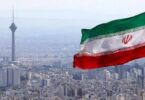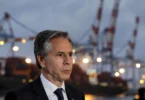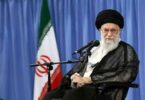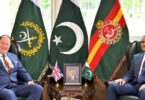BRUSSELS (TASS): A difficult discussion took place at a meeting of the NATO-Russia Council (RNC) at a key moment for European security, and serious differences remain between the parties. This was stated on Wednesday by NATO Secretary General Jens Stoltenberg at a press conference following the meeting in Brussels.
“It was a difficult discussion at a key moment for European security, but this made the meeting even more important. A very serious and direct exchange of views on the situation in Ukraine and European security issues took place. Substantial disagreements between Russia and NATO on these issues,” he said he.
According to Stoltenberg, “it will not be easy to bring the positions closer together.” “It will not be easy to bring them closer together, but we consider it a positive step that we sat down at the negotiating ta-ble and began to discuss. B-oth Russia and NATO agre-ed on the need to resume the dialogue,” he added.
Stoltenberg said that NATO refuses to compromise on the admission of certain countries, including Ukraine, to the alliance.
“All allies are united on the main principle of the alliance: each country is free to choose its own path. Only Ukraine and 30 NATO members can decide when Kiev is ready to become a member of the alliance. Russia has no veto on whether Ukraine can join. to the organization. The Allies are ready to support Kiev on the path to NATO membership,” Stoltenberg said.
He added that NATO told Russia at a meeting of the Russia-NATO Council (RNC) that it sees the presence of Russian troops on the border with Ukraine. “We said we were seeing a buildup of forces, artillery, troops and threatening rhetoric,” he said.
According to the secretary general, “Ukraine is not a threat to Russia, but vice versa.” “Ukraine has the right to self-defense. And, of course, some allies and NATO are helping Ukraine in this,” he said.
Regarding the idea of the aggressive nature of NATO expansion, Stoltenberg said that he considered it to be untrue.
“NATO is a defensive alliance, we have never forced anyone to join our organization. The idea that NATO expansion is currently an act of aggression is not true. NATO expansion has been and remains a cornerstone in the spread of freedom and democracy in Europe”, – said Stoltenberg.
The meeting of the Russia-NATO Council in Brussels became the second stage of consultations between Russia and the Western states on Russian proposals on European security. The first stage – the Russia-US negotiations took place in Geneva on January 10, the third stage within the OSCE will take place in Vienna on January 13. The Russian delegation in Brussels is headed by Russian Deputy Foreign Minister Alexander Grushko and Russian Deputy Defense Minister Alexander Fomin. On the NATO side, the talks were attended by First US Undersecretary of State Wendy Sherman, Alliance Secretary General Jens Stoltenberg, Permanent Representatives of 30 alliance states in Brussels.
As Russian Deputy Foreign Minister Sergei Ryabkov said earlier, Moscow expects from Brussels and Washington “a real step towards Russia.” “Moreover, it is a NATO step, and not a step of Russia towards NATO in terms of modifying its position on key issues,” the deputy minister said.
Russia’s security requirements are addressed to the United States and European states; Moscow has not sent them to such international organizations as the European Union (EU) and NATO. In the most simplified form, the position of the Russian Federation boils down to three points – the withdrawal of American nuclear weapons from Europe, the cessation of the deployment of conventional NATO military forces near the borders of Russia and the creation of a military infrastructure there, and the official rejection of NATO’s plans to draw Ukraine and Georgia into the alliance.
This, according to Moscow, will help correct the serious security imbalance in Europe that arose after the collapse of the Soviet Union and the Warsaw Pact. This will significantly defuse military and political tensions and return to the basic principle, which was signed by all OSCE member states at the 1999 Istanbul summit, that the security of one state or group of countries cannot be ensured at the expense of the security of other states.






